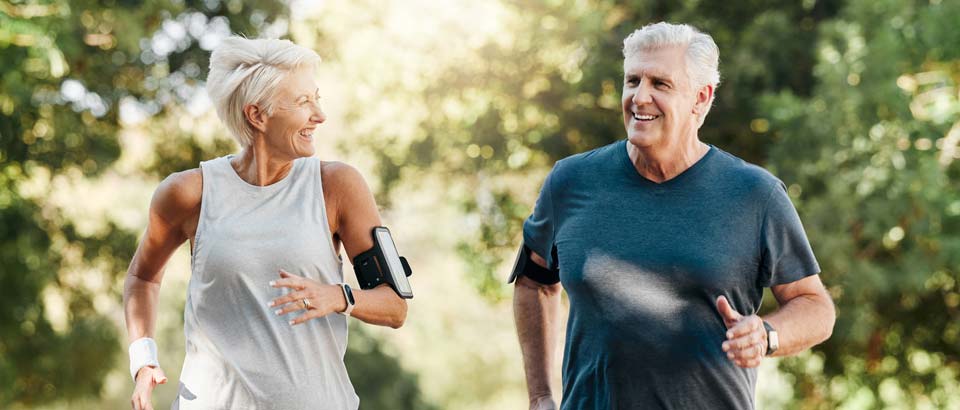August 12, 2024
Now that you’re nearing the half century mark, you may be realizing a few things. You might have a few more aches and pains, but you don’t feel anything like your age. That’s a good thing. And as you continue to grow old gracefully – we hope! – we’ve put together some ways that you can either add or maintain some healthy body and brain habits that can positively impact your health and well-being.
Healthy Aging and You
You can’t control your genetics and family history. You can, however, manage your overall health by ensuring you eat and drink sensibly, exercise, see your provider regularly, manage any ongoing conditions properly and practice good mental health.
Keep in mind that you don’t have to make huge changes overnight. Even by starting with some small positive adjustments, you can increase your body’s health and hopefully live with less pain and illness. Remember to always seek the advice of a provider prior to beginning an exercise program, making dietary changes or with any questions you may have regarding a medical condition that you are experiencing.
Healthy Physical Habits

Keep moving: According to a study of adults 40 and older from the National Library of Medicine,1 those who walked 8,000 steps or more a day had a 51 percent lower risk of death than those who walked 4,000 steps. If you’re aiming to lose weight, hitting 10,000 steps a day is a great way to get closer to your goal. This can burn anywhere from 250-600 calories, depending on your weight.
As you’re walking more each day, there are really simple ways to get closer to your daily goal. Activities such as working on the lawn, walking your dog, parking further from shopping areas or your office and taking the steps instead of waiting for the elevator can all add up.
Maintain muscle mass and tone: As we age, our muscle function often fades and costs us our mobility and independence. Yet if you start working out now, you may maintain muscle through your retirement years. Another study from the National Library of Medicine2 discovered that muscle mass was a better predictor of how long you’ll live after 55 than your weight or body mass index (BMI).
You don’t have to go to the gym and start pumping iron to do this. Just by working on your garden, you can get a workout lifting bags of potting soil, moving plants and even planting and replanting. Just ensure that you’re always lifting safely – always bend from your knees – and be careful that you don’t overdo it.
Keep steady: The CDC reported 1 in 4 seniors have a fall each year and that 1 out of 5 of those falls causes a major injury, such as a head injury.3 To reduce your fall risk, speak with your provider about balance exercises that you can do on a regular basis to stay steady on your feet.
Watch your weight: While a BMI of 18.5-25 is considered healthy, it may be better for seniors to have a BMI of 25 to 27. The National Institutes of Health6 claimed in a study that a slightly higher BMI may protect aging people against issues like osteoporosis and nutrition deficiencies.4
When you have your annual wellness visit with your provider, discuss your current diet and caloric intake with them. It’s a great way to tie in your exercise regimen and what you eat each day.
Get the right amount of good sleep: A lack of proper sleep can contribute negatively to several health issues, including:6
- High blood pressure
- Heart disease
- Type-2 diabetes
- Stroke
The CDC recommends the follow amount of sleep by age:7
- 18 to 60: At least 7 hours of sleep per night
- 61 to 64: 7 to 9 hours of sleep per night
- 65 and older: 7 to 8 hours of sleep per night
How much sleep you get each night may be important, but it must be good quality sleep. If you are getting poor sleep, you may be waking up feeling tired, wake up multiple times at night and experience sleep disorders such as sleep apnea or snoring.
Want to know more? We have you covered with this informative article about sleep disorders .
Quit smoking: Even if you quit smoking after the age of 50, you still have time to enjoy some healthy benefits, which may include:8
- Reduced cardiovascular disease risk
- Improvement in high-density lipoprotein cholesterol (HDL-C) levels
- Reduced coronary heart disease with risk quickly falling one to two years after stopping smoking and reduced risk the longer you stop smoking
- Reduced stroke risk
- Reduced risk of atrial cardiac issues including heart failure and peripheral arterial disease (PAD)
Healthy Mental Habits

As you keep your body feeling better, your mental health should be just as important. The healthy mental state that you work on today will form a foundation for the rest of your life. Here are a few steps to get you started:
Track your brain health: All of our brains change as we age. However, dementia is not a normal part of the aging process. If you or your loved ones show any concern over your cognitive abilities, see your provider sooner rather than later.
Be socially active: As you age, you may find it difficult to maintain connections with other people. However, there are numerous benefits of remaining social. Studies show that people who become socially isolated are at a higher risk of cognitive decline, depression and heart disease.9 There’s even research that shows that those that feel lonely often have weakened immunity.9
How can you stay connected? Look for opportunities to join social groups in your area, get involved in charity work or volunteering, or even stay in touch with friends online or over the phone.
Reduce depression: Unfortunately, getting older isn’t always fun. It can also lead to an increase in depression. It’s important to realize that while sadness is a main symptom, one that many miss is a sense of numbness, which may make you less interested in being active or seeing other people. Depression can also lead to impacts on your physical health, such as sleep disruptions, limiting your appetite, increasing chronic pain and weakening your immunity.10
Get rid of stress: As we age, stress doesn’t go away. Finding ways to lessen it and be more emotionally stable is just as important after 50 as before. There are several ways that you can try to improve your mental health:
- Try meditation techniques or physical activities
- Keep a journal to help you track your moods
- Reach out to family and friends when you need them
- Consider visiting a mental health professional
MedExpress Pro Tip: Self-care may be a term that younger people use a lot but there’s no reason why you shouldn’t be taking advantage of its benefits. Learn four simple self-care strategies to help take care of yourself better.
Here’s to you and your journey toward aging gracefully. By following these tips and remaining both physically and mentally active, the years to come could be even more rewarding than the ones you’ve already lived through.
Originally published May 2024. Updated August 2024.
References:
1 National Library of Medicine / National Center for Biotechnology Information. Association of Daily Step Count and Step Intensity With Mortality Among US Adults. Last updated March 24, 2020. Accessed February 5, 2024.
2 National Library of Medicine / National Center for Biotechnology Information. Muscle Mass Index as a Predictor of Longevity in Older Adults. Last updated February 14, 2014. Accessed February 5, 2024
3 CDC. Older Adult Fall Prevention. Last updated April 12, 2023. Accessed February 5, 2024.
4 CDC. Adult BMI Calculator. Last updated September 2, 2022. Accessed February 5, 2024.
5 National Library of Medicine / National Center for Biotechnology Information. What is the Optimal Body Mass Index Range for Older Adults? Last updated March 26, 2022. Accessed February 5, 2024.
6 Harvard Health Publishing. The health hazards of insufficient sleep. Last updated July 14, 2017. Accessed February 5, 2024.
7 CDC. About Sleep. Last updated May 15, 2024 Accessed August 12, 2024.
8 CDC. Benefits of Quitting Smoking. Last updated May 15, 2024. Accessed August 12, 2024.
9 National Institute On Aging. Social isolation, loneliness in older people pose health risks. Last updated April 23, 2019. Accessed February 7, 2024.
10 Psychology Today. Depression and Physical Health. Accessed February 7, 2024.
